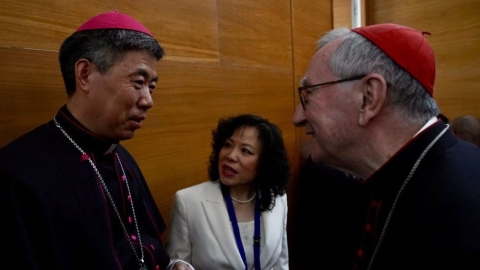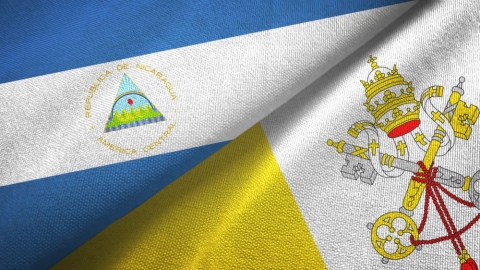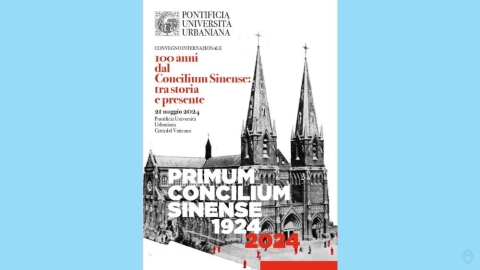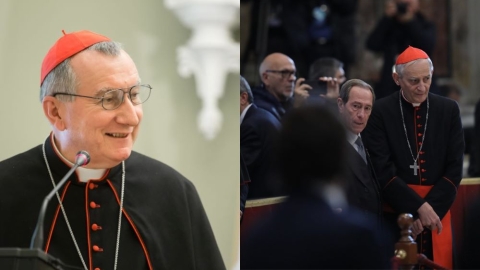Fourth Assembly of the Synodal Path: A Schism Consummated (1)

In what direction will the German Synodal Path go?
From Thursday September 8 to Saturday September 10, 2022, the fourth and penultimate assembly of the German Synodal Path took place in Frankfurt, which was an opportunity to measure the determination of part of the Church of Germany to go to the end of a process that tends to schism.
The Synodal Path looks more and more like a forced march, with a clearly avowed objective: to obtain a maximum of reforms in the little time left to the process.
Even the participants complain about it: it is going too fast. On the menu, 14 texts to be examined in three days, several of which contain several dozen pages. Speaking time is limited to 1 minute per person and outside remarks have caused concerns, like the recent interview by the co-president, Mrs. Irme Stetter-Karp, in favor of legal abortion.
On the agenda are nine “basic” texts, as well as five “action” texts – the first being more doctrinal, and the second relating to practical resolutions. It is a question, among other things, of the creation of synodal councils, the possible opening of compulsory celibacy for priests, and the doctrinal reassessment of homosexuality.
And the long-term objective is clear for Agnes Wuckelt, the vice-president of the Association of Catholic Women of Germany: the next synodal assembly is very important for women because “decisive steps will then be set in motion” for proposals for change that “will move the church community around the world.”
As for Msgr. Georg Bätzing, president of the German Episcopal Conference, and one of the co-presidents of the Synodal Path, he affirmed at the opening of this fourth assembly, that he felt “an infinitely great pressure in favor of change,” from the base of the Church. This is why the results of the Synodal Path must be deposited on the “table of the universal Church.”
A Novel View of Homosexuality
Helmut Dieser, Bishop of Aachen, said he received no criticism from fellow bishops for saying homosexuality was willed by God. “Many of them support this position,” he said on the sidelines of the plenary assembly on Thursday.
He added: “With our texts, her we submit a vote to the magisterium of the Church… so that it results in an evolution of the catechism and the conception of the Church on homosexuality.” He pointed out that gay people are just as wanted by God as heterosexual people.
Birgit Mock, vice-president of the central committee of German Catholics (ZdK), relying on social sciences, recalled that according to the catechism, people with a homosexual orientation are required to not live their sexuality: the catechism must therefore be reformed.
Stetter-Karp's Statement on Abortion
On Thursday, the plenary assembly of the Synodal Path debated on the declarations on abortion made by Irme Setter-Karp, co-president of the Synod and president of the ZdK who had recently stated, in a press article, that there should be “widespread availability” of abortions, including in rural areas.
Before the synodal assembly, Stetter-Karp declared that she was committed to the protection of life and to paragraph 218 of the German penal code relating to abortion. Bishop Bätzing, distanced himself from the statements of the lay president on the theme of “the widespread availability.” There now exists an insoluble disagreement between the position of the bishops and the declarations of Mrs. Stetter-Karp.
While the Path seemed to be unfolding quietly, Thursday evening September 8 saw a more or less unexpected turn of events. The first text to be voted on, that of the fourth forum “Living successful relationships - Living love in sexuality and partnership” with an explicit subtitle: “Main themes of a renewed sexual ethics,” was rejected by a blocking minority of the episcopate.
It should be remembered that, to be ratified, a text must be approved by a two-thirds majority of the general assembly, as well as the same majority of the bishops. Now, while 82.8% of the delegates present voted in favor of the text, 38.9% of the bishops voted against it, so the text was therefore rejected.
Warnings of Rupture
If one takes the trouble to read this document of about 30 pages, there is enough to provide proof that the rupture with the doctrine of the Church has been largely achieved. The text first accuses the sexual doctrine of the Church of having “manifestly favored” intolerable acts of sexual violence.
And the text continues: “We sincerely ask forgiveness from all those who have suffered the consequences of the sexual teaching of the Church.… We are committed to seeing to a change in the teaching and practice of the Church in matters of human sexuality, taking into account the knowledge of the social sciences.”
Need we remember that these social sciences are subject to many ideologies and prejudices that lead to errors or biases, and that in no case can they represent a source of Revelation?
The conclusions of the document are to match: “For all sexuality, the dignity of the persons concerned must always be respected as an expression of the image of God. The right to sexual self-determination is part of dignity.” And again: “Respect must be given to any form of sexual identity and sexual orientation.”
Next comes the rejection of revealed morality: “Homosexual sexuality – realized also in sexual acts – is not a sin that separates from God and should not be judged as bad in itself. Homosexuality is not a criterion of exclusion for access to ordained ministries.” Further on, the text recognizes onanism as a legitimate form of sexuality.
The text then affirms that “partnerships between people of the same sex … should also be able to consider themselves placed under the blessing of God, expressly granted by the Church, and be able to live from this blessing. This also applies to people entering into a new partnership after a failed marriage.”
What is most astonishing is not that 21 bishops out of 60 voted “against,” the text, but that 33 of them voted “for” such a text – 3 others having abstained and 3 more did not vote.
The Beginning of Chaos
The scenes that followed on the one hand show that the majority is not ready to accept what the minority thinks: anger, disappointment, desertion, accusations of concealment against the opposing bishops, criticism of the voting system, and tutti quanti; and, on the other hand, that the agenda is to push through the revolution at all costs.
Several bishops have thus shown their determination to use the text in their diocese, despite its rejection. As for Bishop Bätzing, he announced that therefore “we will take it to the level of the universal Church when we are in Rome in November for the ad limina visit when we go about preparing the World Synod with the continental bishops’ conferences in January.” He also said he would submit it to his synodal authorities in the diocese of Limburg. He finally decided that they would scrap the secret ballot system and that bishops will henceforth submit to a role-call vote.
At the end of this first day, a tiny glimmer of hope seemed to shine. But in fact, the schism of a good part of the German episcopate is already consummated in their minds and in their hearts. What follows will show it.
(Sources : katholisch.de/InfoCatolica – FSSPX.Actualités)
Illustration : Photo 116109966 / Bifurcation © Julienviedts | Dreamstime.com





